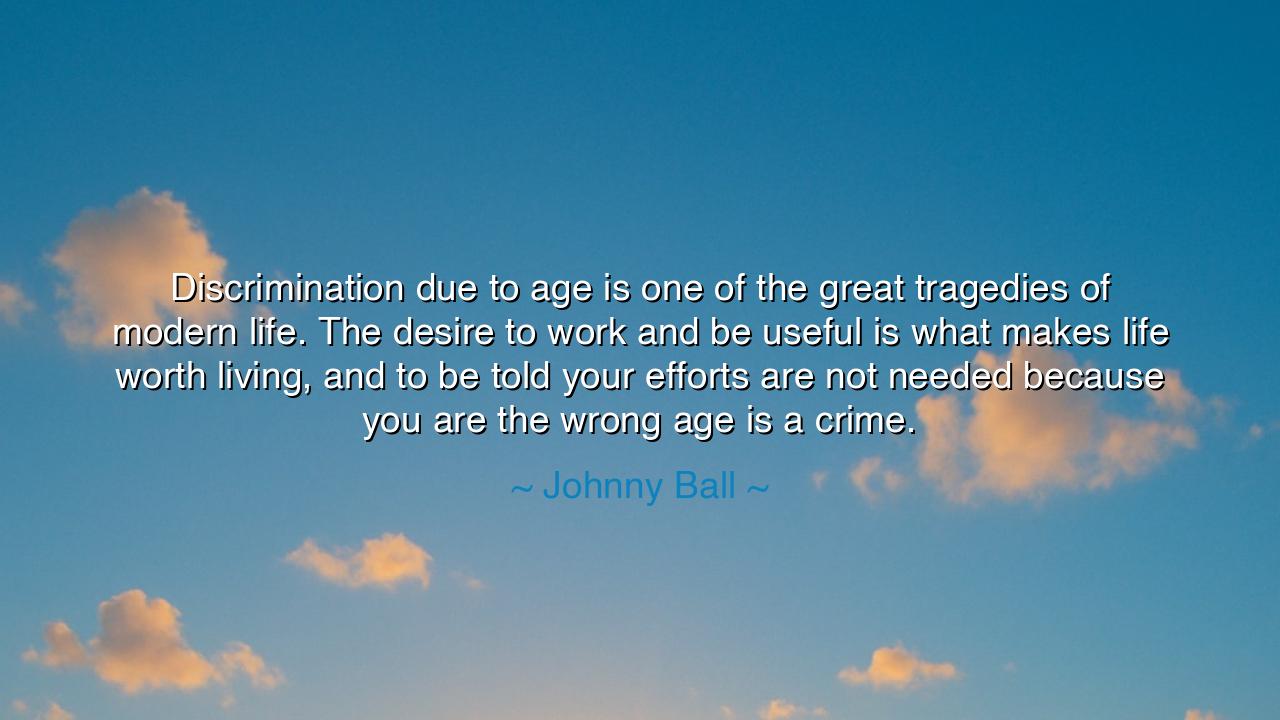
Discrimination due to age is one of the great tragedies of modern
Discrimination due to age is one of the great tragedies of modern life. The desire to work and be useful is what makes life worth living, and to be told your efforts are not needed because you are the wrong age is a crime.






The wise educator and broadcaster Johnny Ball, a man who devoted his life to awakening curiosity in others, once declared: “Discrimination due to age is one of the great tragedies of modern life. The desire to work and be useful is what makes life worth living, and to be told your efforts are not needed because you are the wrong age is a crime.” In these words, he speaks not only for the elderly, but for the dignity of all humankind — for every soul that wishes to remain purposeful until its final breath. His words are both lament and warning: that a society which casts aside its elders commits an offense not merely against individuals, but against wisdom, gratitude, and humanity itself.
The origin of this quote lies in Johnny Ball’s later years, as he reflected upon the changes in modern culture — a world obsessed with youth, novelty, and speed. Having once inspired generations of children through his science programs and joyful teaching, Ball saw how the world had grown impatient with age, treating it not as a crown of honor, but as a burden to be hidden away. Yet he refused to accept such injustice quietly. His cry was not one of self-pity, but of principle. For he knew that the desire to contribute, to remain useful and creative, is not the privilege of the young — it is the essence of life itself.
To say that age discrimination is a tragedy is to recognize the sacred bond between generations — a bond that modern life too often severs. The ancients revered their elders, not merely for their years, but for the light those years had kindled in their hearts. In the tribes of old, the elder was the keeper of stories, the guardian of knowledge, the living link between past and future. To silence such voices is to lose the map of wisdom that guides civilization. In Ball’s words, we hear the grief of an age that has forgotten how to listen — an age that confuses vitality with youth, and discards experience as though it were obsolete.
History offers countless examples to prove that age is no barrier to greatness. Consider Michelangelo, who painted the ceiling of the Sistine Chapel in his sixties, and carved the Pietà Rondanini with trembling hands in his eighties, still searching for perfection. Or Nelson Mandela, who, after twenty-seven years in prison, became a symbol of reconciliation and leadership at an age when others retire. These were not men diminished by time, but refined by it. Their age was not a weakness, but a reservoir of endurance and perspective. Johnny Ball’s words remind us that when we deny our elders the chance to contribute, we deny ourselves the fruits of their wisdom.
The meaning of Ball’s lament runs deeper than employment or productivity. It speaks to the human soul’s need for purpose — for the knowledge that one’s existence still matters. When people are told their efforts are no longer needed, a kind of quiet death begins long before the body’s end. The spirit withers when it cannot serve. To rob someone of their usefulness is to rob them of meaning — and that, Ball insists, is a crime against the very essence of life. For work, in its highest form, is not merely labor; it is participation in the ongoing creation of the world. To tell someone they are “too old” is to exile them from that sacred participation.
Yet Ball’s words are not only a reproach — they are a call to awakening. He urges both the young and the old to resist this cruel illusion of age as limitation. The young must learn to honor those who came before them, to seek their counsel rather than dismiss it. The old must refuse to believe that their value has diminished, for the flame of purpose burns as long as breath remains. Society must become a circle again — not a pyramid of youth rising over age, but a wheel in which every generation turns together, sustaining and learning from one another.
The lesson, therefore, is as timeless as it is urgent: do not measure worth by years, but by spirit. The measure of a life is not its age, but its willingness to serve. Let every person, whether sixteen or seventy, find a way to contribute — to teach, to create, to mentor, to dream anew. Employers, leaders, and families alike must see that inclusion of all ages strengthens the fabric of humanity itself. To uplift the old is to preserve the memory of who we are; to empower them is to remind the young of what they might yet become.
Thus remember, O child of every generation, that time is not your enemy — it is your teacher. Youth will one day fade, but purpose need never die. Honor those whose hands have built the road you walk upon. And if ever you grow weary or gray, remember the words of Johnny Ball: the desire to be useful is the heartbeat of existence, and to deny it — in yourself or in another — is to turn away from life itself. So work, serve, and share your gifts until your final dawn, for in usefulness lies immortality — the undying legacy of a life fully lived.






AAdministratorAdministrator
Welcome, honored guests. Please leave a comment, we will respond soon